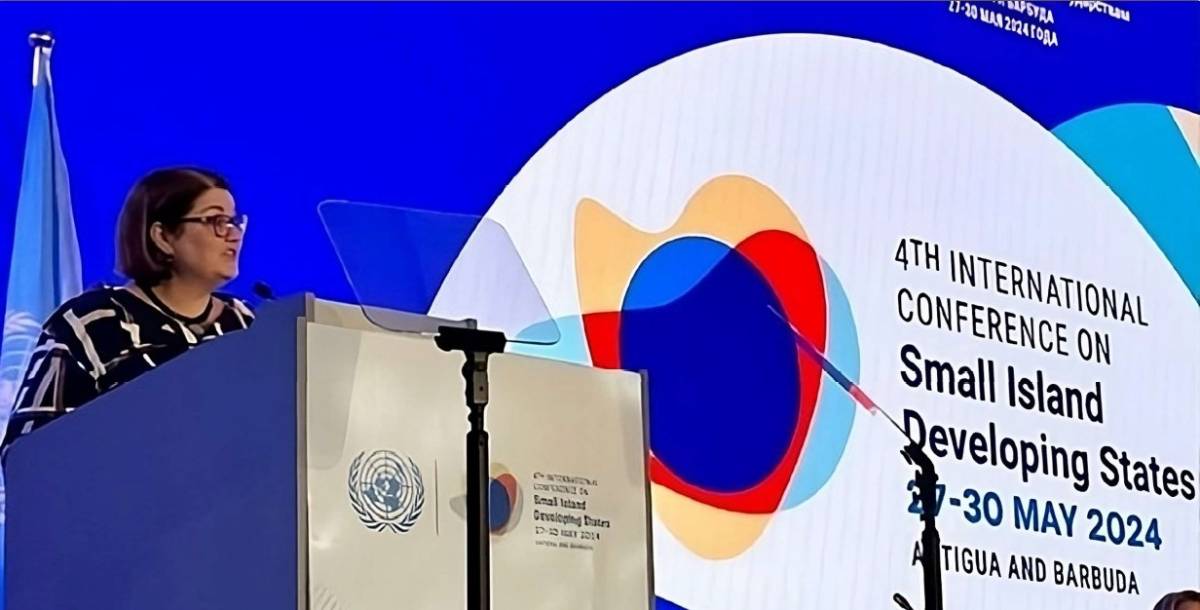
New Zealand works closely with Pacific partners to amplify their voices, and to ensure the multilateral system delivers practical and meaningful outcomes that reflect their needs.
Key priorities for Pacific Island countries include: effective climate action and responses to the threats posed by sea-level rise; access to development and climate finance; addressing vulnerabilities to external shocks; and developing sustainable blue economies.
UN Small Island Developing States (SIDS) Conference
New Zealand played a central role in the success of the Fourth UN International Conference on SIDS in Antigua and Barbuda in May. New Zealand’s Pacific Island development partners and Timor-Leste are all SIDS.
The – Antigua and Barbuda Agenda for SIDS – A Renewed Declaration for Resilient Prosperity (ABAS) adopted at the Conference provides a 10-year plan for SIDS through which the international community committed to support SIDS’ leadership in creating solutions to challenges which imperil their lives, livelihoods, and well-being.
The ABAS sets out a range of commitments on measures to address the impacts of climate change, build resilience to social and economic vulnerabilities, improve access to development and climate finance, and enhance data collection to assess progress.
It also encouraged the use of a multidimensional vulnerability index (MVI) to assess development status. This better reflects the unique challenges and vulnerabilities faced by SIDS than traditional measures such as per capita gross domestic product (GDP).
New Zealand served as co-chair of the Conference preparatory process and oversaw the ABAS negotiations. New Zealand contributed NZD$1 million towards the costs of hosting of the Conference and supported travel by SIDS participants and research on SIDS issues. New Zealand will continue to be a supportive voice for SIDS as states move to implement these commitments.
Addressing the threats posed by sea-level rise
Pacific Leaders have been clear that climate change and the sea-level rise that it causes are the defining issues facing the region. In responding to these challenges, New Zealand has worked closely with Pacific partners to ensure that State’s rights and entitlements under international law are protected.
New Zealand worked with Pacific Island countries to develop the Declaration on the Continuity of Statehood and the Protection of Persons in the Face of Climate Change-related Sea-Level Rise issued by Forum Leaders at the 52nd Pacific Islands Forum (PIF) in the Cook Islands in November. The Declaration, together with the Declaration on the Continuity of Statehood and the Protection of Persons in the Face of Climate Change-related Sea-Level Rise issued by Forum Leaders in 2021, aim to protect the statehood, sovereignty, maritime zones, and people of those countries most impacted by sea-level rise.
New Zealand is working with Forum Members and the international community to ensure the purposes of these Declarations are achieved. New Zealand co-facilitated the preparatory process for a High-level Meeting of the UN General Assembly on addressing threats posed by sea-level rise to be held in New York on 25 September. Occurring during UN Leaders’ Week, this meeting will focus high-level attention and build international support for solutions that reflect Pacific Island and other low-lying countries’ needs.
Preparations for the High-Level Meeting have enhanced international awareness of the multi-faceted nature of sea-level rise, including the important role played by science and evidence-based decision-making, the need for climate action and financing, socioeconomic considerations, and international legal dimensions.
International partners, including the National Aeronautics and Space Administration (NASA), United Nations Educational, Scientific and Cultural Organisation (UNESCO), United Nations Development Programme (UNDP), the International Law Commission, and World Meteorological Organisation, have contributed to the process.
The UN resolution and decisions generated by this process will be the first-ever dedicated UN products on the issue of sea-level rise and will include recognition by the international community of the two PIF Leaders Declarations, mentioned above.
New Zealand’s leadership and advocacy on these issues demonstrates the importance of the multilateral system for small states, including our Pacific partners, and the opportunities multilateral cooperation provides to highlight their challenges and needs, safeguard their rights, and deliver practical outcomes.

